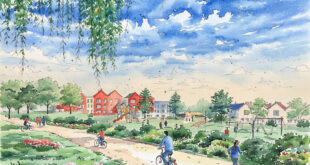People have faced new challenges while getting used to living with “certain uncertainty” during the first full year of the pandemic, a psychiatrist has said.
As the country reaches the end of a full calendar year of living with coronavirus the changes continue, with new restrictions announced in recent weeks to combat the recently emerged Omicron variant.
Dr Chris Pell, chairman of the general adult psychiatry faculty at the Royal College of Psychiatrists in Scotland, said human brains are “not built to deal with uncertainty” and people have had to become adaptable to cope.
However this has become more difficult as the pandemic has gone on, bringing lockdowns and restrictions, with reports of a rise in mental health problems.
He said: “It’s comparable to the sorts of restrictions seen in wartime and I think it’s followed that trajectory as well.
“At the beginning there’s that sense of community, everybody’s in it together and community spirit comes to the fore, but, as it wears on, it starts to get more draining and people use up the reserves they have got and start to begin to struggle.
“In psychiatry referrals that have come through, we have seen a shift as the pandemic has gone on from the early days when it tended to be people who had a pre-existing mental health problem that had then, either because support had been disrupted or they had not been able to speak to friends and family, it has exacerbated their symptoms.
“As it has worn on, we are seeing probably more folk who had not had difficulties before going to GPs and saying ‘I’m really starting to struggle’ and not sure what to do going forward.
“What has not helped has been all the uncertainty throughout. Human brains are not built to deal with uncertainty.”
He added: “With the way that the pandemic has gone on, new variants cropping up, it just triggers those worries of what we are heading into, and I think people find it difficult to adjust and know what they are facing.”
A recent survey for the Royal College of Psychiatrists in Scotland found that, since the coronavirus crisis began in March 2020, nearly a third of Scots (32%) have suffered anxiety.
Meanwhile, almost a quarter (24%) of 1,080 adults surveyed in early November said they have suffered symptoms of depression and 23% have experienced loneliness.
Dr Pell, a consultant psychiatrist based in Angus, said humans are incredibly adaptable and many have tried to find ways to make the best of a bad situation.
“It’s about trying to manage some of that almost sort of certain uncertainty,” he said.
“We know it’s going to be uncertain for a while to come so let’s try and control the things that we can control and try not to worry about the things that are just going to happen anyway.”
People with more serious symptoms may need psychiatric help.
However, Dr Pell said there are a number of things people can do to help themselves cope during the pandemic, including limiting their exposure to the news and social media and avoiding “doom scrolling” online.
He also suggested connecting with friends and family, whether virtually or in person, spending time outside, exercising and eating a good diet.



